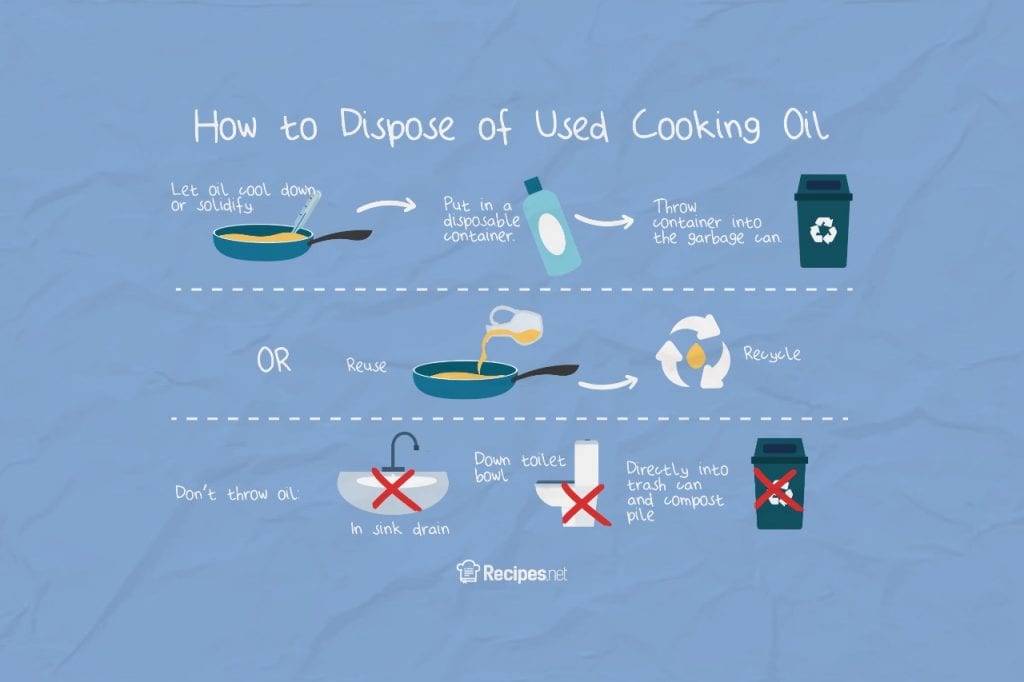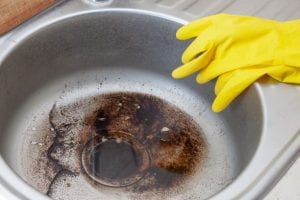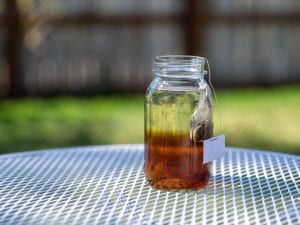
Big and small restaurants, food chains, and home cooks use oil for cooking, more specifically frying. Not only is frying so convenient and simple, but it also gives us enjoyable and delicious ways to savor our favorite comfort food. We all know that oil makes our food taste finger-lickin’ good, the important question is – How to dispose of cooking oil properly and safely?
Improper oil disposal doesn’t only pose a threat to the environment but can also cause a major inconvenience in communities and homes. For example, the most common household problem that it brings is clogging your kitchen sink and household pipes that can take hours to fix. This gives us more reasons to use and dispose of cooking oil in an eco-friendly way.
In this article, we share tips and options on how to safely dispose of cooking oil at home, in the best way possible. After all, a clean and safe kitchen is important in making and serving good food. Aside from these oil disposal tips, you might also want to check out our list of fun kitchen hacks for tips and tricks that you need to know to make home cooking easier and faster.
How to Safely Dispose of Cooking Oil

Some of the easiest homemade recipes require frying. We all enjoy a crispy and delicious muncher for a snack. Something that is convenient to do at home without sacrificing the taste of our favorite comfort food. Admittedly, as much as we enjoy frying, it also takes effort in disposing of cooking grease and oil.
Here are some smart ways to dispose of your frying oil after making your favorite healthy deep fried mushrooms or after digging into some cheesy jalapeno poppers:
Let the oil cool down to room temperature first.
Turn off the heat right after cooking and let all the grease residue cool down. It will take 2 hours for the oil to completely cool down before it can be poured over into a jar for disposal.
You can even chill your used oil and store it in the freezer for 24 hours if you prefer to make it solid waste.
Place the oil into a container before disposing of it.
You can use an old can, a plastic bottle, milk cartons, or a glass as a container for your used oil or grease. Just make sure that the container has a lid lock that can be sealed. Make sure the oil is stored in these bottles and not directly in plastic bags as those are prone to damage and leakage.
Opt for a paper towel, washcloth, or an old t-shirt to soak up the remaining oil from the pan, so when you’re going to wash it, there will be no more oil residue going down the sink.
Throw your used oil in tightly sealed containers properly.
Once the container is sealed tightly, place it in a plastic bag and throw it together with your food trash from the kitchen. You can even mix it with other absorbent trash you have at homes such as garden soil, sand, flour, or even cat litter to make it a solid waste.
Doing Your Own Oil Recycling at Home

Gone are the days when we thought we could only use our cooking oil once in the kitchen. With the amount of cooking oil that we use every single day, we’re glad to give you ideas on how to recycle or repurpose it in ways you never thought you could use it for. It’s not only cost-effective for us, but it’s also good for the environment as we reduce our waste. Just take notes on how to recycle them with these tips we have in line for you!
Store and reuse cooking oil.
You don’t necessarily have to dispose of cooking oil after frying, but you can reuse it instead. Pour your used oil into a jar with a cloth or filter to remove all the bits and hard particles of the cooking oil. Then, you can reuse it several times, depending on the type of food you’re cooking. Otherwise, you can even choose to freeze your oil till it hardens, and instead of tossing it away, reuse it in the future after thawing.
Now, how many times exactly can you cook with reused oil? If you are cooking light and clean vegetables such as making deep fried french fries, you can reuse your used cooking oil up to eight times! But if you’re cooking breaded meat such as chicken or fish, you can only reuse it three to four times.
Repurpose your used cooking oil.
Aside from reusing cooking oil to make your favorite dishes, you can also repurpose it into different household items.
You can use it as a lubricant for old and rusty locks. Or use it to polish your leather shoes till they shine. Paint on your hands? You can actually remove the paint easily with used oil! Apart from used cooking oil, you can also try these neat hacks with expired oil. There are tons of creative ways on how to repurpose cooking oil in our own homes, so make sure to give them a try.
Look for a local collection site to dispose of used oil.
Contacting local collection sites will help you on managing your waste disposal properly. Earth911, for example, is a community-specific organization that aims to provide a center for recycling services for eco-friendlier waste management.
With the Recycling Center Search feature on their website, you can simply search for the item you want to recycle and your zip code, and they will direct you to different disposal events and sites near you. They also offer more ways on how to recycle waste such as used cooking oil.
Common Mistakes of Oil Disposal At Home

We might be already doing some of these mistakes in our own homes without knowing the consequences it may take upon our household and environment. Here are some of the very common mistakes we mindlessly do in our own kitchen that we should take note of:
Draining the oil through the sink.
A lot of us actually toss the oil from the cooking pan directly to the kitchen sink to get rid of cooking oil. Some even put the hot pan under running water as it spills the oil and grease down the sink. If you’re still doing it, we suggest that you avoid repeating these mistakes as they will clog your home pipes. It can affect your neighborhood sewer system and can cost you or your community a lot of damage.
Flushing the oil down the toilet.
Science tells us that oil and water can’t be mixed together. Pouring cooking oil down to your toilet will not only clog your toilet but will also ruin the walls of your drainage and the whole piping system of your household.
Disposing of used oil in the trash can or compost pile.
Hot oil will attract insects and animals such as houseflies and rats, especially in a garbage disposal. It will also ruin your fertilizer and damage your compost, so make sure not to dispose of hot oil on your trash cans or compost pile.
Tips on How to Unclog Kitchen Sink

If you’ve been doing bad oil disposal practices for some time and ended up clogging your pipes, here are the things you’ll be needing to do to unclog your kitchen sink at home.
- Pour boiling water down your sink. Pour boiling water directly into the hole and see if it’s still clogged. Repeat the process until the water starts to drain slowly.
- Melt the clog using baking soda and vinegar. Place one cup of baking soda into the sink, followed by one cup of vinegar. Cover the drain’s opening for 15 minutes. Pour over boiling water on the sink afterward.
- Use a plunger. Place the plunger around the sink tightly and plunge it repeatedly. Remove the plunger and pour hot water down the sink.
- Clean your sink’s P-trap. The P-trap is the curve of the pipe under the sink. Simply unfasten that part and clean its interior. Put it back and run hot water to the sink repeatedly.
Now that You Know How to Dispose of Cooking Oil Properly…
Learning to dispose of cooking oil properly or repurposing it for other uses is beneficial to both yourself and Mother Earth. You won’t have to deal with the pesky unclogging of sinks or waste precious money hiring a plumber, all while saving the environment! We hope you’ve learned some great tips to try in your home for a smarter, better living!











